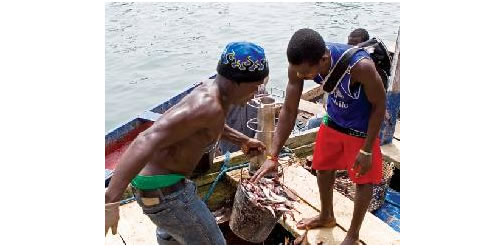50,000 to lose jobs in fisheries sector

The Chief Executive Officer of Thai Union of France, the parent company of Pioneer Food Cannery (PFC) in Tema, Ms Elizabeth Fleuriot, has prayed the government to work around the clock to sign an Interim Economic Partnership Agreement (IEPA) with the European Union (EU).
That, according to her, would enable Ghana to continue to enjoy duty-free export to the EU?market on quota-free basis.
He said should Ghana fail to sign the agreement, it would mean her exports to the EU market would now attract tariffs of up to 20.5 per cent, in the case of tuna, which would throw businesses out of gear and employees out of jobs.
Some of the companies that the Daily Graphic spoke to indicated that they would have no choice if the tariffs came into force but to close their shops and relocate to more favourable environments.
“Ghana is a big exporter to the EU and signing the EPA is really to the advantage of Ghana; it is very favourable for the country. It will help grow businesses and national development. We are talking about $6 billion business which affects tuna, pineapples, cocoa, banana and the like. This is the business that is at risk from October 1. And behind this business, we are talking about 50,000 jobs,” she said.
Ms Fleuriot was in the country to support the local team at PFC to meet with government officials to explain the seriousness of the agreement and implications for the country should it fail to sign it.
She met with the ministers of Trade and Industry as well as Fisheries, and other high-ranking government officials. The local and international Thai Union team could, however, not meet the ministers of Employment and Labour Relations and the Foreign Affairs and Regional Integration on the same subject.
The CEO of the world’s largest producer of tuna products also held discussions with the EU Mission in Ghana, which indicated to her their willingness to support Ghana to initial the IEPA.
“I was at the plant and everybody was there. I saw employees who have been with the company for 15 to 20 years who suddenly fear for their jobs and this is why we are very concerned as a company,” she said.
The Daily Graphic has gathered that the Ministry of Trade and Industry would soon issue a statement to clarify Ghana’s position on signing the interim trade pact.
Some sources within the ministry, however, told the Daily Graphic Ghana had shown enormous good faith in signing the agreement and securing the future for businesses that export to the EU market.
To that end, the source indicated that the country had gone further to prepare the EPA Response Strategy which it would present to the European Union Commission to support.
Ghana is expected to sign an IEPA with the EU by October 1, this year to continue to enjoy free access to the larger EU market. This is because the Economic Community of West African States (ECOWAS) as a bloc could not sign a substantive EPA by the close of 2014 and last year. Ghana, therefore, needs to protect its individual interests by signing an initial or interim pact, while awaiting the larger ECOWAS to sign the agreement.
Ghana and Cote d’Ivoire are among the largest exporters to the EU and hence the EPA means more to them than the rest of the ECOWAS member countries. Cote d’Ivoire signed an interim agreement last year.
Should tariffs be slapped on exports from Ghana, which include cocoa and cocoa products, tuna and horticultural products, exports will now attract tariffs and the volume of exports could also be restricted. This will create competitiveness challenges for the local companies, which could force some of them to close up shop and relocate to countries such as Cote d’Ivoire or any in South America, as they will become a more competitive alternative to Ghana, should it fail to sign the pact.
Companies and jobs affected
More than 15 companies primarily target the EU market for their exports. Together their volume of exports is worth more than $6 billion and employs more than 50,000 Ghanaians.
The big exporting companies that will be impacted by the tariffs besides Pioneer Food Cannery Ltd, which employs over 2,000 employees between boats and factory, include Cosmo Seafood Company Ltd, West African Fisheries Ltd, Myroc Foods Ltd for tuna; with pineapple and banana producers including Golden Exotics Ltd, Volta River Estate Ltd, Jei-River Farms, Bomart Farms, Sam Valley Farms, Milani Exports and Koranco Farms will also to be impacted.
Vegetables producer VegPro Limited and its peers are not left out as are cocoa and cocoa products exporters such as Barry-Callebault, ADM, Cargill and Touton.
“It has become very urgent to sign this EPA because if it is not signed, it will mean that by October 1, 2016, suddenly we will have plus 20.5 per cent duty on imports of tuna from Ghana, meaning people in Europe will suddenly have to pay 20.5 per cent more on their tuna, because it is coming from Ghana.
This will make the businesses in Ghana uncompetitive and not viable,” Ms Fleuriot stated.
She was emphatic in saying, “This is not something that we can sustain.”
Source: Graphic.com.gh



